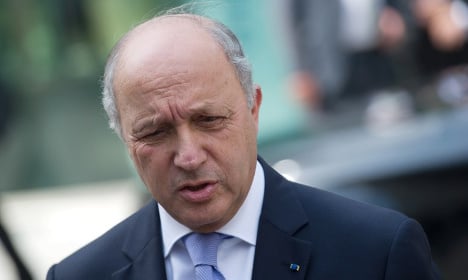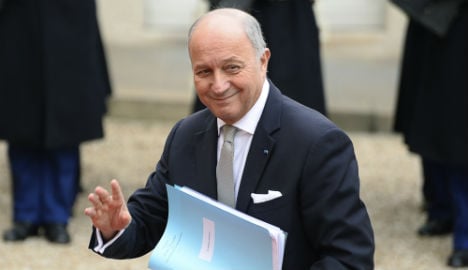Fabius is due in Tehran on Wednesday and Iran's conservative media carried attacks about the imported blood case which occurred when he was France's prime minister.
Fabius was one of six foreign ministers in the talks with Iran that led to a landmark nuclear deal in Vienna on July 14th.
His Tehran visit is geared to winning new business in Iran for French companies which, until the imposition of Western sanctions, had been among the biggest foreign investors in the Islamic republic.
Some ten of Iran's 290 members of parliament have written to Foreign Minister Mohammad Javad Zarif asking him to withdraw the invitation for Fabius to visit on account of his “treacherous acts against Iran,” ISNA news agency reported.
Iran's government has defended the visit.
In the 1980s, the French National Blood Transfusion Centre distributed blood products contaminated with the AIDS virus, causing the death of hundreds of people in France, where the products were subsequently banned.
But lots of contaminated blood continued to be exported, including to Iran, leading to the infection and deaths of hundreds. In 1999, Fabius was acquitted by the French courts over the scandal.
Fars, a news outlet associated with the Islamic republic's powerful Revolutionary Guards, quoted Mojtaba Zolnour, a hardline cleric, as criticising the French foreign minister.
“Fabius is coming to Iran during the Support of Haemophiliacs week and this reminds us about losing some of our compatriots because of imported infected blood.
“The main cause of it was Fabius,” Zolnour said.
He also hit out at Fabius over French support for now executed dictator Saddam Hussein's Iraq during its 1980-88 war with Iran and over his “hard” position during the negotiations for this month's nuclear deal.
“During the imposed war, France was at Saddam's service,” Zolnour said, citing deliveries of hi-tech Mirage fighters.
“France had a serious role in helping Saddam have access to weapons of mass destruction,” he added, arguing that Fabius's visit was all about trade.
“We had around $30-40 billion of trade with France before the sanctions which led it to drop to $3 billion. Fabius is very much under the influence of France's economists, companies and cartels.
“They want to guarantee their share of Iran's future market.”
Saying he was not calling for Fabius's trip to be cancelled, Zolnour added: “Officials should pay attention to the fact that an enemy is going to enter our country and so our national interests, dignity and power should be preserved.
“We should not get excited by Western officials coming so that they won't feel that we are excited.”
Health Minister Hassan Hashemi said the blood scandal was a separate legal dispute and Fabius's trip should go ahead.
“Fabius is an international figure… it is not in the interest of the country to raise it (the blood row) now,” Hashemi said, according to the
official IRNA news agency.



 Please whitelist us to continue reading.
Please whitelist us to continue reading.
Member comments